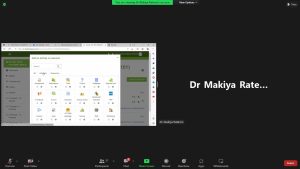During the 2nd Surveillance Audit under the ISO 9001: 2015 Standards by the Kenya Bureau of Standards (KEBS) held on Wednesday, 30th November and Thursday, 1st December 2022, a number of non-conformities were found and recommendations for corrective action were made. One of these non- conformities was the lack of evidence that the submission of class attendance registers was done before the commencement of examinations. The root cause of the non-conformity was the lack of a work plan, maintained at the departmental level, detailing the exact time when analysed class attendance registers are to be submitted to Heads of Departments each semester.
As a corrective measure, the External Auditor, Mr. Isaac Mureithi, recommended that the Directorate of Quality Assurance and ISO, in collaboration with the Directorate of ODeL, conducts training on how to navigate the Learning Management System (LMS) platform to generate class attendance registers. Additionally, the training was to discuss how to formulate a standard way of analysing class attendance. All the affected departments are, then, expected to provide evidence of analysis of class attendance in their annual work plan and the timelines for undertaking analysis of class attendance as per the current academic procedure.
The two Directorates, today, mounted a sensitization session for academic members of staff on how to generate class attendance registers. Chaired by Prof. Michael Lokuruka, the Director, Research, Innovation and Extension, on behalf of the Director, Quality Assurance and ISO, Prof. Mugo Mware, the interactive session brought to the fore the obligation of every member of the teaching staff to provide evidence of class attendance of students, especially in the virtual space. According to Procedure 3 in the Academic Procedure Manual, an analysis of class attendance is required to be submitted to the Heads of Department two weeks before the start of examinations.
The Director, ICT, Dr. Cyprian Makiya Ratemo, on behalf of the Acting Director, ODeL, Dr. Joan Wakasa, took participants through the LMS interface and its affordances. He stated that whilst the LMS mode is unique, it presents a number of challenges as to the conduct of teaching and learning. It is, nevertheless, possible to maximally use the platform to achieve the required objectives. One of the challenges is the generation of class attendance registers in the blended mode of instruction compared to the physical classroom setting. Inasmuch as the responsibility to attend online classes and perform the tasks required solely lies with the students, lecturers were advised to be keen to monitor their students’ class attendance patterns. Class attendance of students, he stated, leaves digital footprints on the LMS platform which can help generate the registers.
‘The transition from physical to the virtual system of learning has presented the challenge of students being unavailable to undertake online tasks given by lecturers. Online learning, unlike the traditional classroom delivery of content, has affected the participation of students. However, this can be mitigated by taking a broad-based approach, as opposed to handling class attendance in isolation, to generate an account of their participation.’
Dr. Makiya articulated the need for lecturers to employ a task-based approach where they teach and give assignments after every session. Here, the students will be required to submit these assignments via the LMS platform. These assignments will help in generating evidence of learners’ involvement in every session. He also cited the need to forge a tripartite relationship where learners interact with

